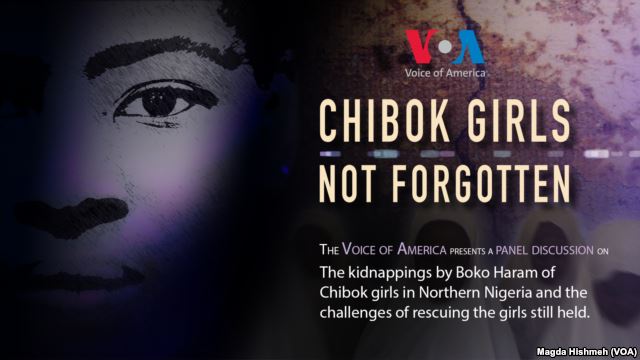One Year In Captivity: Anniversary of Nigeria’s Chibok Girls Marked by VOA
 WASHINGTON, D.C. —Voice of America today marked the first anniversary of Boko Haram’s abduction of more than 200 Nigerian schoolgirls who are still missing and thought to be captives of the terrorist group in the forests of northern Nigeria.
WASHINGTON, D.C. —Voice of America today marked the first anniversary of Boko Haram’s abduction of more than 200 Nigerian schoolgirls who are still missing and thought to be captives of the terrorist group in the forests of northern Nigeria.
In a panel discussion at VOA’s Washington headquarters, Congresswoman Karen Bass (D-CA) said the girls kidnapped from the Chibok Government Secondary School “only wanted to be educated” and “we must fight for and defend all people who want to be educated.”
The campaign of violence by Boko Haram, which in English means “Western Education is Sinful,” has kept many young people from attending school. Chibok principal Hajiya Asabe joined the VOA discussion by telephone, saying Boko Haram must not be allowed to win this battle against education.
Congresswoman Frederica Wilson (D-FL) vowed to keep up the pressure on Boko Haram by backing U.S. support for Nigerian and regional efforts to confront the group and free the girls. She urged the audience to join the Twitter campaign for the Chibok girls #BringBackOurGirls. “Your assignment,” she said, “is to tweet daily so that the world will not forget the missing girls.”
VOA Director David Ensor says VOA’s Hausa Service has stayed with the story of the Chibok girls over the past year and assured the audience that VOA “is going to stay with it – through our coverage and by events such as this.”
VOA’s panel discussion, “Chibok Girls: Not Forgotten,” is available online.
For more information about this release, contact the VOA Public Relations office in Washington at (202) 203-4959, or write to publicrelations@voanews.com. For more information about VOA, visit the Public Relations website at www.insidevoa.com, or the main news site at www.voanews.com.
VOA reaches a global weekly audience of more than 172 million people in nearly 50 languages. VOA programs are delivered on satellite, cable, shortwave, FM, medium wave, streaming audio and video and more than 2,350 media outlets worldwide. It is funded by the U.S. Congress through the Broadcasting Board of Governors.

